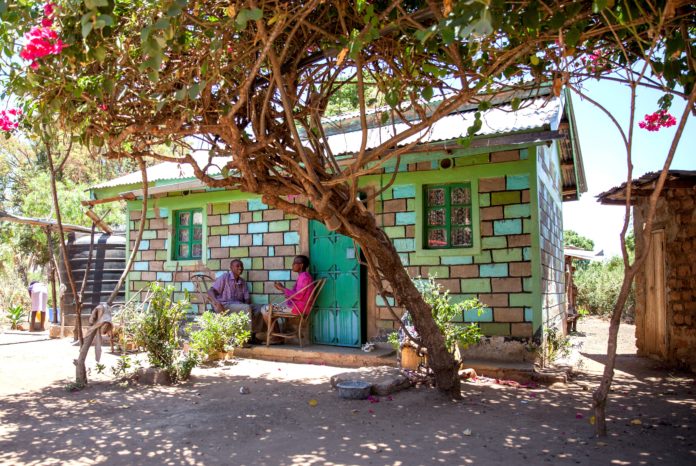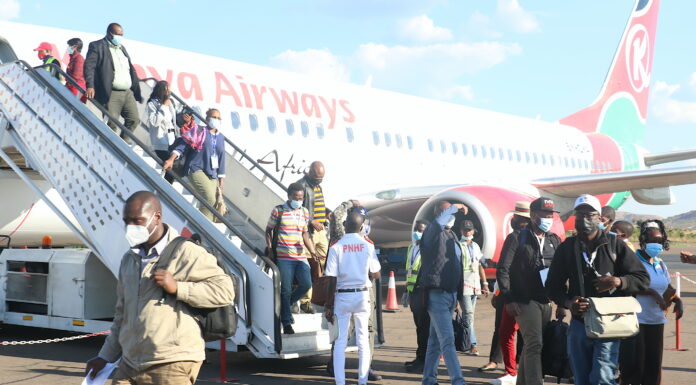A new report reveals significant increases in the quality of life among clients who obtain microfinance loans for housing improvements
A new report from Habitat for Humanity’s (www.Habitat.org) Terwilliger Center for Innovation in Shelter shows that low-income people in Kenya who obtain innovative microfinance loans to improve their housing also experience a significant increase in their quality of life.
The report is an impact evaluation study of the Building Assets, Unlocking Access (https://bit.ly/2qmfPml) project, a partnership between Habitat for Humanity’s Terwilliger Center for Innovation in Shelter and the Mastercard Foundation. The project helped financial institutions to develop effective housing microfinance products and services.
“We know there are strong connections between safe, decent housing and a family’s health and financial stability,” said Patrick Kelley, Vice President of Habitat for Humanity’s Terwilliger Center for Innovation in Shelter. “Through these microfinance products, individuals earning as little as US$50 per month, a population that is typically excluded from banking and financial services, can access affordable loans that will help improve their living conditions and build, extend, or renovate their homes.”
In Kenya, Habitat’s Terwilliger Center worked with Kenya Women Microfinance Bank (KWFT) to develop the housing microfinance product Nyumba Smart Loan. The report, which surveyed 1,250 women clients of KWFT over a one-year period, showed that low-income women who accessed the loan increased their overall housing satisfaction by almost 15 percent.
Findings from the study showed that clients who accessed the Nyumba Smart Loan were able to invest in water and sanitation improvements such as flushing toilets and the installation of safe water sources. Households reported as being mostly happy with the quality of their walls and roofs, the number of rooms in their houses, and the quality of building materials used to construct the houses.
Adequate Housing Critical Issue for Many Countries
“This impact study demonstrates that the benefits of convenient and affordable housing microfinance can be far-reaching for people living in poverty,” said Ruth Dueck-Mbeba, Senior Program Manager at the Mastercard Foundation. “Having a bank account and the services it offers is a doorway not just to better housing but to a greater sense of well-being for individuals and for communities.”
Access to adequate housing for low-income earners is a critical development issue facing many countries around the globe. Kenya, where housing is recognized in the constitution as a basic human right, is no exception. Approximately 61 percent of Kenyans live in temporary shelter or extremely low-quality housing, affecting the overall well-being of households.
Over the past few years, the microfinance sector has grown in Kenya to address challenges such as the lack of access to decent housing and formal financial services for low-income people. Housing microfinance consists of small, non-mortgage backed loans starting at just a few hundred dollars that can be offered to low-income populations in support of incremental building practices.
Opportunity to Scale Housing Microfinance
Through the Building Assets, Unlocking Access project, Habitat’s Terwilliger Center provided technical assistance to six leading financial institutions in Uganda and Kenya to develop housing microfinance products and services. To date, this project has seen more than 69,000 loans disbursed and US$60 million has been mobilized for developing incremental housing finance in these two countries.
As part of the project, housing microfinance loans were offered not only to informal workers with unsteady incomes, but also to low-income salaried workers making between US$5-10 per day.
Habitat for Humanity believes that housing microfinance can and should become a mainstream offering for financial institutions in Sub-Saharan Africa as they respond to growing housing needs in the region, particularly from people with low income. The business case for developing and scaling housing microfinance has been proven through the work of financial institutions in Kenya and Uganda. The organization firmly believes that this model can be adopted in other parts of Sub-Saharan Africa.















